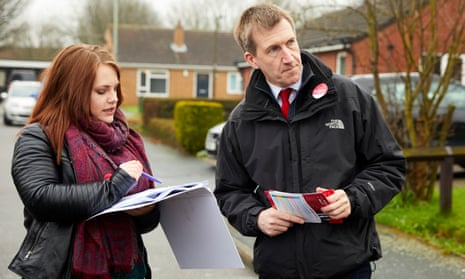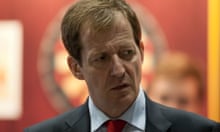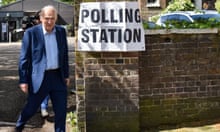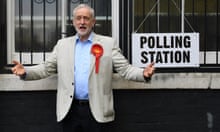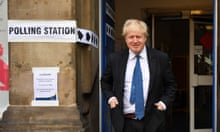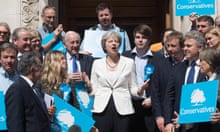On a grey weekday morning in Scawsby, Doncaster, the Labour MP Dan Jarvis is knocking on doors to garner support for his bid to be the first mayor for the Sheffield city region – a role that comes with no agreed powers, no agreed budget and no agreed salary. “Apart from that, what’s not to like about it?” he jokes.
The government’s decision to push ahead with the election on 3 May, despite south Yorkshire’s local authorities – Sheffield, Rotherham, Barnsley and Doncaster – failing to agree a devolution settlement, has been criticised as strange and undemocratic.
Barnsley and Doncaster pulled out of an initial deal agreed in 2015 last September, following disputes over the route HS2 would take through the region. The two authorities are now among 18 of 20 Yorkshire councils to back proposals for a devolution deal for the whole historic county area, while the government has insisted that the Sheffield city region mayoral election will take place as it was legislated to do so by parliament.
The role of Sheffield city region mayor is, therefore, less about wielding power and more about trying to obtain some. “If I’m elected mayor then the very first thing that I will do on my first day is sit down with the four leaders and work out precisely how we are going to reach an agreement that satisfies all of the constituent parts of south Yorkshire,” says the MP for Barnsley Central. “We need an agreement that enables us to start drawing down on the maximum amount of power and the maximum amount of money.”
The former army major, who was once tipped as a possible future Labour leader, was finally formally endorsed as the party’s candidate earlier this month after a row with the NEC over whether he should be able to keep his parliamentary seat if he wins. He had won a vote by local party members by 58% in March. Jarvis’s plan to remain in Westminster was permitted after protests by the Yorkshire and Humber group of Labour MPs.
As far as Jarvis is concerned, the Sheffield devolution deal is an interim step. He is one of an increasing number of politicians to have been converted by arguments for a Yorkshire-wide devolution deal and his eventual goal is to see the Sheffield city region join a settlement for the whole county, something Jeremy Corbyn endorsed last week.
Jarvis admits that this is not a particularly catchy electoral pitch, but he insists that it works. “There is a strong awareness of the arguments for a wider devolved arrangement for Yorkshire,” he says. In December, 85% of those who voted in a community poll held by Barnsley and Doncaster councils said they would prefer to be part of a Yorkshire deal as opposed to a Sheffield city region one. “There is solid support for it, not just in Barnsley and Doncaster, but across south Yorkshire as well,” Jarvis says.
In what has been dubbed the Socialist Republic of South Yorkshire, Jarvis’s win seems assured. All of the county’s 15 MPs are Labour, save for Jared O’Mara in Sheffield Hallam, who was suspended from the party following complaints about homophobic and sexist comments. Jarvis’s main opposition in the mayoral race is split, with pockets of strong Green and Liberal Democrat support in parts of Sheffield and some Tory support in Barnsley and Doncaster.
He has six opponents, including candidates for the Yorkshire party, South Yorkshire Save Our NHS and the English Democrats. The Conservative candidate, Ian Geoffrey Walker, a local businessman, stood against Nick Clegg in Sheffield Hallam in the 2015 and 2017 general elections. The Lib Dem candidate, Hannah Ruth Kitching, runs a manufacturing business and is also standing to be a councillor in Barnsley. The Green party candidate is Robert Murphy, a heating engineer and councillor in Sheffield.
Out canvassing with Jarvis is Kevin Rodgers, a Labour councillor in Doncaster. He says he would be astonished if Jarvis did not win, but adds: “Thinking back to 2009 in Doncaster, at the height of the expenses scandal, we got a real protest vote and we got an English Democrat mayor.” (Peter Davies served a four-year term in the role, resigning from his party in early 2013, citing a big influx of new members from the British National party.) “So, never say never,” Rodgers says.
Unlike Sheffield and Barnsley, Rotherham and Doncaster are not holding council elections in May, meaning turnout in the towns could be low. A prominent campaign against tree-felling taking place in Sheffield could result in its Labour council losing some seats in the city’s comparatively affluent south-west, but it is not an issue Jarvis thinks will affect the mayoral race. He acknowledges voices on either side of the argument, but welcomes the council’s decision to pause the felling.
Many people opening their doors to Labour activists in Doncaster seem unaware of the upcoming mayoral election. Rebecca Chambers, 20, is coming out of her newly built council house on her way to start her first day in a beauty therapist job, when she runs into the canvassers. “I’d vote if I understood it,” she says. Asked whether she identifies as being from the Sheffield city region, she says no. “Donny first, then Yorkshire.”
Even if the four south Yorkshire councils reach a devolution agreement, the new mayor is unlikely to be rolling in cash. The offer on the table includes just £30m a year over 30 years. Jarvis, however, argues that the mayor’s power goes beyond that given to them by central government.
“The greatest power that any mayor has is the power to bring people together,” he says. Jarvis is running on a Labour and Co-operative ticket and boasts that his manifesto has “co-op principles hardwired through it”, with plans to help set up more mutuals, cooperatives and community interest companies in south Yorkshire.
“I think I’m possibly the only person who was simultaneously in the parachute regiment and the Co-op party,” he says. “And although there are many differences between those organisations, there is one very strong principle that underpins both and that is the need and importance of working alongside other people. At a point when resource is scarce, we have to think even more carefully about how we pool our resources.”
